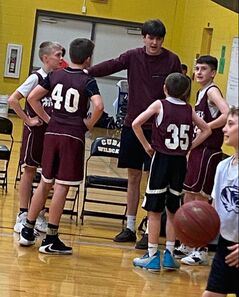Bridging Leadership Lessons from the Workplace and Those Experiences Shaping Today's Youth and Tomorrow's Leaders
 In my last post I shared a specific example of when my 17-year-old son had a frank and honest discussion with me about my shortcomings as a coach with his younger brother’s team. It probably wasn’t easy, but it was effective as it helped me realize the changes that I need to make so that I can have a positive impact on their future. Isn’t that why we choose to coach? To impact others. This post isn’t to debate the ability of today’s youth to receive tough coaching or a mentality of coaches who are treating the game of basketball as if it is a life-or-death situation. This is to talk of the merit and necessity of having fierce conversations with the people you are coaching. Coaching Your Players Let’s be honest. Just like in work, school and relationships, a lot of people don’t want to be coached. They are looking for positive affirmation and reinforcement that what they are doing is right and that they are exceptional. You see this with many travel organizations and so-called trainers that focus on the show and not about the know. They don’t correct poor fundamentals or decision making and instead praise them because one shot finally goes down. Those coaches ARE impacting the kids' future, but maybe not in the way you are hoping. Having tough conversations are essential to not only build trust but to lay the foundation for future success. I talk about this in my 3 Pillars of Impact series. If your players know you care and you have invested in their emotional bank account, then you can have those tough conversations. All Shots are not Equal The number of kids who truly understand the intricacies of the game seem to be shrinking by the day. Much of this is because most kids are not sitting down and watching games. They are either playing them - on the court or on their video game - or they are watching highlight clips. Kids fail to recognize the difference between a good shot, a tough shot, and a bad shot. As a coach, this must be explained to your player so that understand the expectations of them and their teammates. A good shot is one that you practice and has a high probability of going in. A tough shot has a level of difficulty that lowers your shooting percentage, but depending upon the player and the situation, you may be fine with the tough shot. Or you may prefer that it gets passed around until a good shot can be taken. A bad shot is a shot taken by someone who has not practiced the shot and is forced up with a low probability of being made. A bad shot does not mean it was missed or can’t be made, but it typically is not the shot that you want taken. Also, the same shot for one player may be a good shot but for another it could be a tough shot or a bad shot. I have watched players on teams who do not consistently shoot at a high 3pt percentage continue to fire shots up because they are open. Well, they are open for a reason! The worst part is when you watch a 30% 3pt shooter add difficulty to their shot by shooting a step-back shot. That is taking a bad shot instead of making the extra pass to find the right person in the right spot. Steve Kerr explained to Draymond Green that if you keep moving the ball, “The ball will always find the guy who's supposed to get the shot.” Coach Kelvin Sampson of the University of Houston explained how it’s not rocket science to determine if a person is a good shooter or not. If the person is shooting 40% from three, then they are a good shooter. If they are shooting closer to 25% then they are not. During an interview he talks about how people lie to a kid, and they don’t hear the truth until they get to college. People will tell them 'You're a good shooter. Keep shooting.' No, you're not. Don't. When people complain and tell him that he’s hurting their confidence, he responds with a class line and hard truth, "I don't want to build a bad shooter's confidence up." Coaching Your Parents Sometimes, what can be more difficult than reigning in a player who is out of control, is helping parents come to grips with reality. Every year I have those tough conversations with my parents. I don’t tell them that their child can’t achieve things later in their sports career, because we all know that there are kids who mature early and dominate and then never grow. There are also the kids who play B Team their entire youth career and then go on to play college basketball. But the tough conversation is about their current challenges and weaknesses so that you can snap them back to reality, and then talk to them about their potential and what it will take to get them there. I was approached by the grandfather of a player of mine who wanted to sponsor and organize a team that would travel to the AAU tournaments, and he wanted me to coach. I agreed and pulled together some kids from different ages and from the surrounding community. We put together a team that was a nice team for our area but was getting slaughtered in the St. Louis area. But it was a great experience and the younger kids on the team became the core group of a team that would go on to dominate later in their careers. The issue was that the grandson was not one of those players. You could tell he really didn’t want to be there or put in the work. He didn’t love the sport like the other kids. He was there strictly because of his grandpa. The following year, the grandfather again approached me about doing the travel team. I loved this man and his passion for the game. I appreciated all he had done for us, and the easy thing would have been to keep going, allowing him to fund our activities and ignore the fact that his grandson was falling further and further behind and was visibly becoming less and less interested in the game. Well, a tough conversation was inevitable. I was direct. I didn’t hold back any punches because this was a confident and determined man. But I was also empathetic and compassionate. I was open and honest. I explained to him where I felt his grandson was and what would be in his best interest. Years later, he ran into my wife at a store. He shared with her and others the story of that conversation and how much he appreciated it for both his grandson and for him. He talked about how it opened his eyes to their relationship and how he wasn’t seeing his grandson for who he was but instead what he wanted him to be. One day, as I listened to a set of parents complain about their kid not getting his shot when the kids moved to Junior High school ball, I asked what they expected. This player had been doing individual workouts with a trainer I had introduced to the team and was definitely getting better but honestly, I don’t know that he really wanted to put in the work to get better. The parents were doing everything they could, but the kid, well, he was just doing what they wanted. I pulled them aside and asked them directly, “whose spot do you see him taking?” I addressed the strengths of the kids in front of him and how they match up with what is needed in high school. I then asked them about specific shortcomings of their son and did a compare and contrast versus the other players. Again, I asked them, “Based upon what we just discussed, despite being the parent, if you were the coach, why would you give him someone else’s spot?” I told them, he’s going to need to change his game and HE must work harder, not you guys. Conversation to Impact Ohio State basketball coach, Chris Holtmann, shared a story about his player, Malaki Branham, who is entering the 2022 NBA Draft. Coach Holtmann tweeted out a text he received from Malaki the morning after an early season loss. In his tweet the Coach said, “Gratitude, self-awareness, accountability and grit on full display here.” “Good morning, Coach. Just wanted to say thank you for keeping your word through the recruitment, with playing through my mistakes. Thank you for trusting and believing in me by putting me in last night with 2 minutes left to go when you didn’t have to. I’ll be better for my team and you coaches.” The young man I talked about above, whose parents wanted him to be successful more than he was willing to work, well, he improved so much he was able to dress and play varsity as a freshman. He was a 3-year starter and went on to play college basketball. After his high school graduation, his dad pulled me aside and thanked me for that tough conversation that happened years ago. He said that when he shared what I said with his son, it really hit home and his son understood that while he wanted to be successful, he had not committed to being successful. That moment he transformed his desire into effort and was able to achieve his dreams. That young man received the tough conversation with openness and accepted the intent of the message, understanding full well that it was delivered with love. That willingness to grow and be coached helped him to understand that the work he was doing was not for the present, but for his goals that were Beyond Today.
0 Comments
Leave a Reply. |
AuthorTom Brown - a husband and a father who is simply trying to make a difference. Using my experience as a Manufacturing Executive to connect leadership from the boardroom to the hardwood to help teams grow and develop to make a difference in the lives of others. Archives
May 2024
Categories |
Proudly powered by Weebly

 RSS Feed
RSS Feed

